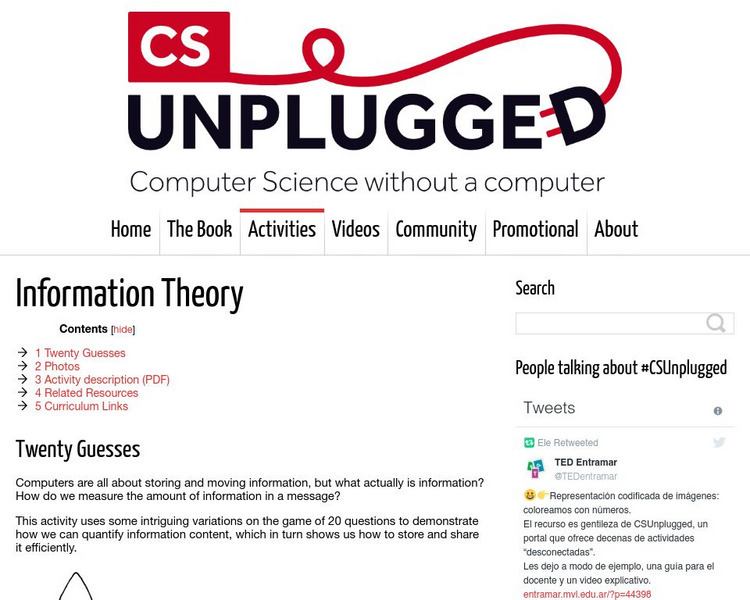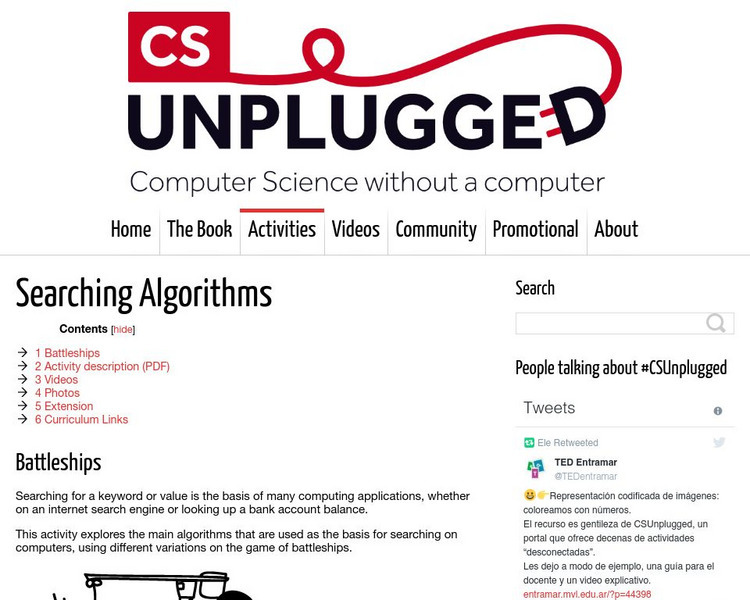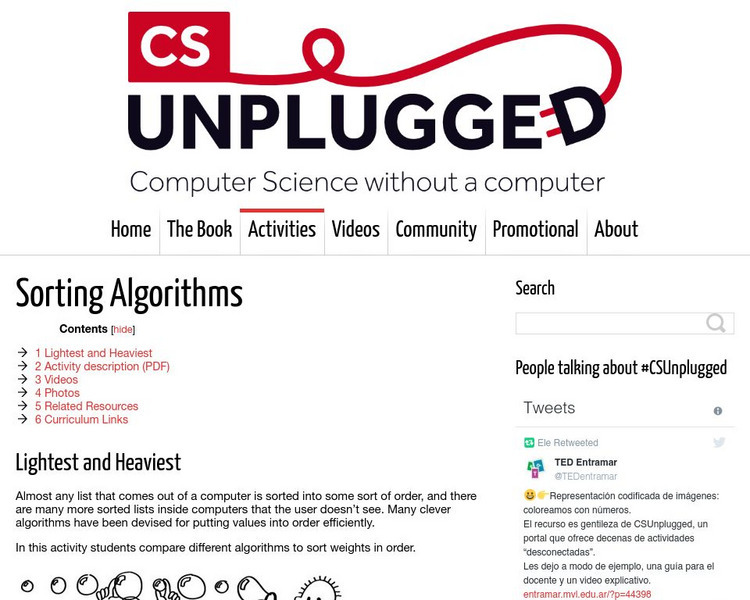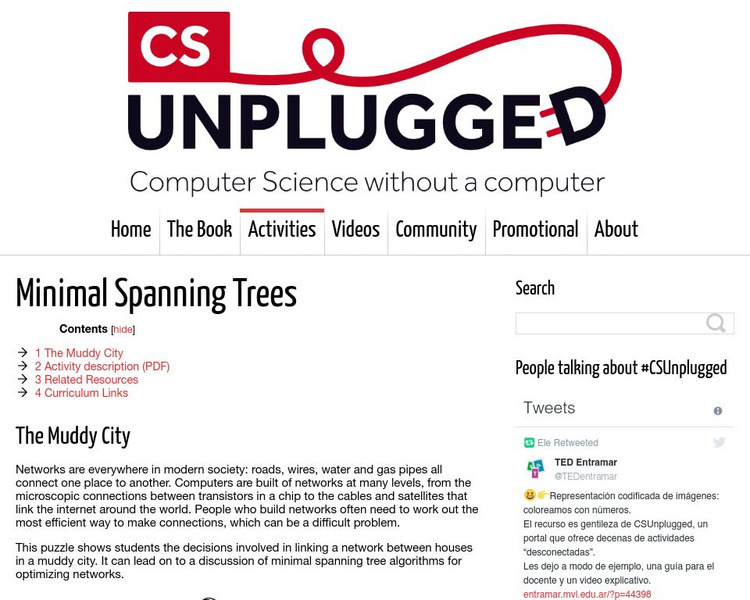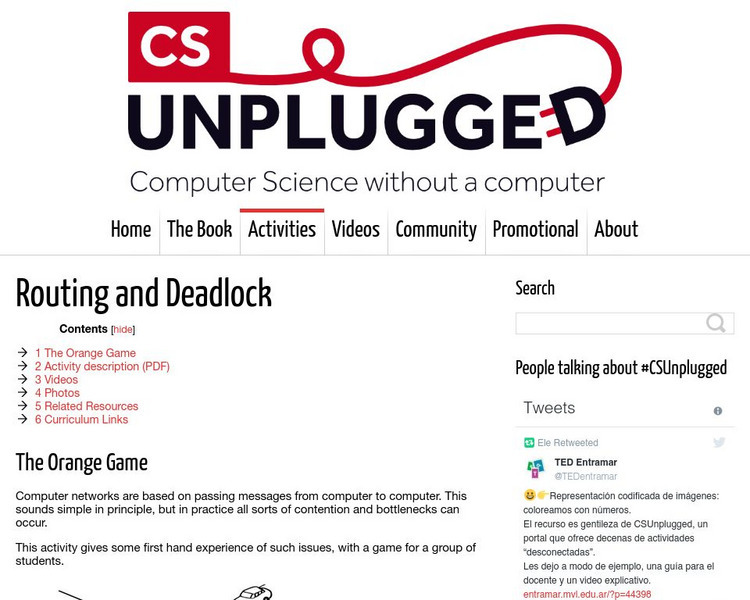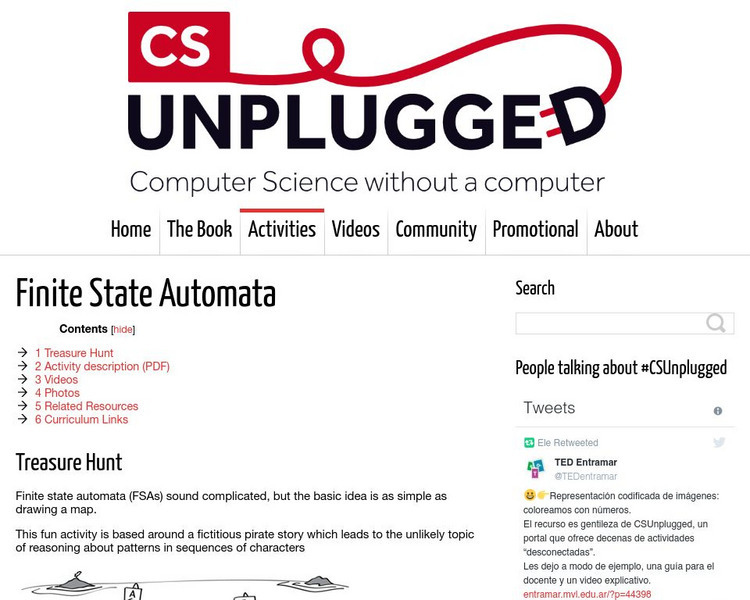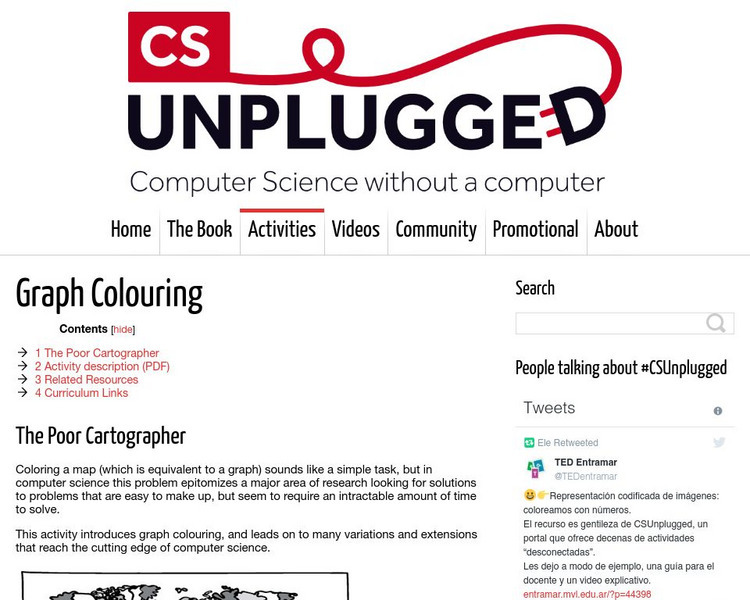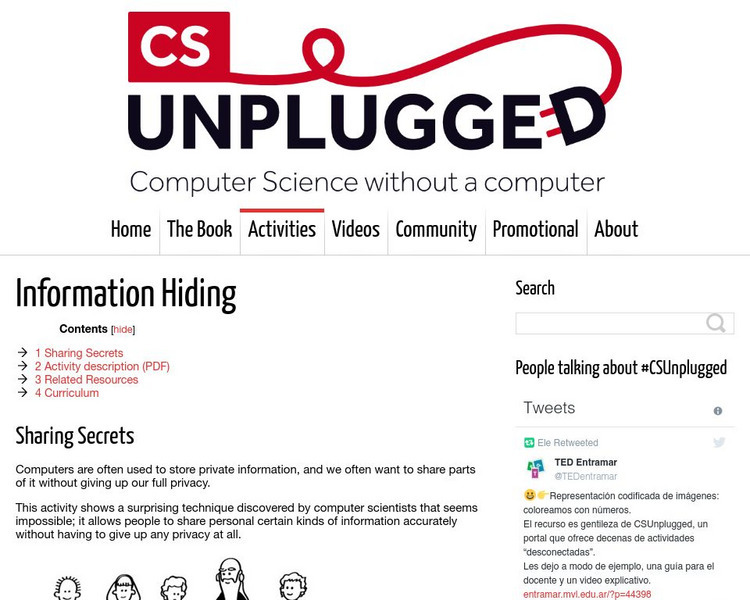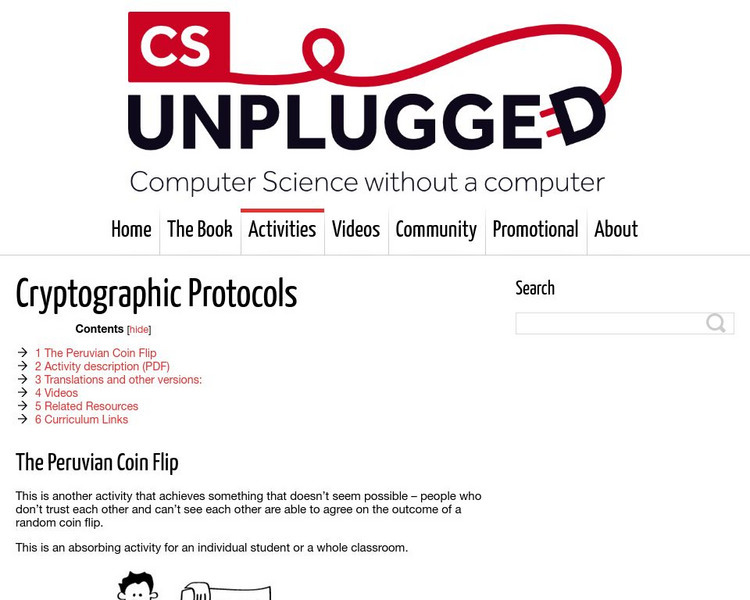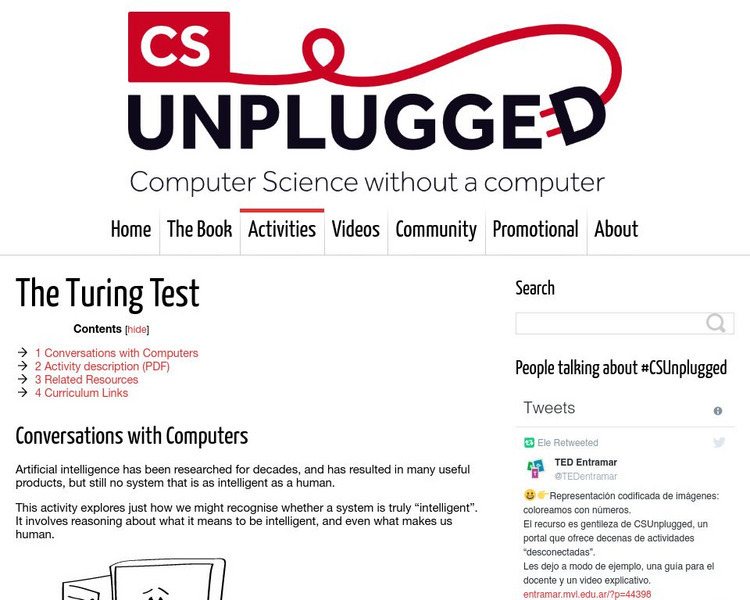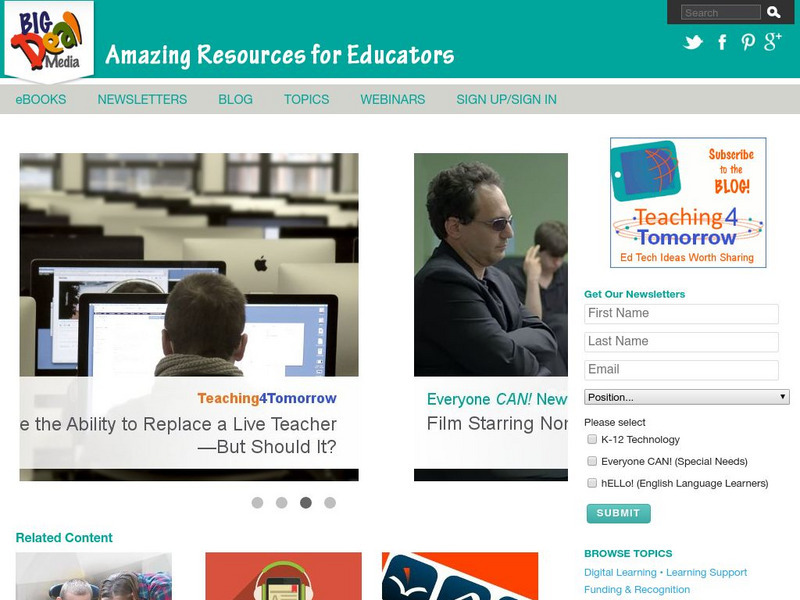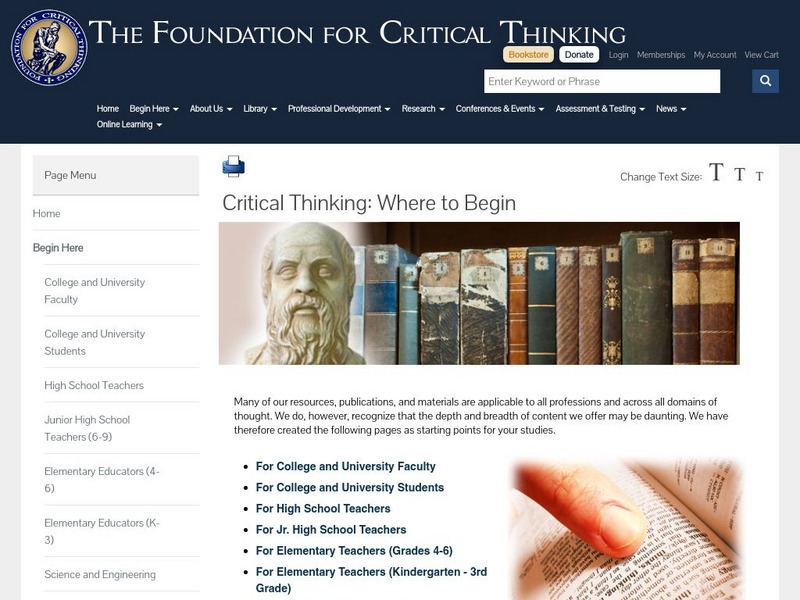University of Canterbury
University of Canterbury: Cs Unplugged: Information Theory
This activity uses variations on the game of 20 Questions to demonstrate how we can quantify information content, which in turn shows us how to store and share it efficiently when it comes to computer technology.
University of Canterbury
University of Canterbury: Cs Unplugged: Searching Algorithms
Explore the main algorithms that are used as the basis for keyword searching on computers, using different variations on the game of battleships.
University of Canterbury
University of Canterbury: Cs Unplugged: Sorting Algorithms
Many clever algorithms have been devised for sorting values into order efficiently. In this activity students compare different algorithms to sort weights to simulate how computers devise sorted lists.
University of Canterbury
University of Canterbury: Cs Unplugged: Sorting Networks
A student team activity that demonstrates an approach to parallel sorting, or how much computation can be done at the same time. It can be done on paper, but the lesson plan becomes more meaningful if the students do it on a large scale,...
University of Canterbury
University of Canterbury: Cs Unplugged: Minimal Spanning Trees
This puzzle shows students the decisions involved in linking a network between houses in a muddy city. It can lead on to a discussion of minimal spanning tree algorithms for optimizing networks.
University of Canterbury
University of Canterbury: Cs Unplugged: Routing and Deadlock
Computer networks are based on passing messages from computer to computer. This sounds simple in principle, but in practice all sorts of contention and bottlenecks can occur. This activity gives some first hand experience of such issues,...
University of Canterbury
University of Canterbury: Cs Unpluggeed: Network Protocols
Students learn what information makes up a protocol for bits of information added to messages to make sure they are sent over the internet.
University of Canterbury
University of Canterbury: Cs Unplugged: Finite State Automata
This student activity is based around a fictitious pirate story which leads to the unlikely topic of reasoning about patterns in sequences of characters. Experiencing this concretely will help lay the foundation for understanding finite...
University of Canterbury
University of Canterbury: Cs Unplugged: Programming Languages
Help build the foundation of understanding computer languages with this activity. Demonstrate some of the issues that arise when we try to give precise instructions to achieve a desired outcome.
University of Canterbury
University of Canterbury: Cs Unplugged: Graph Colouring
Introduce graph coloring, and lead learners on to many variations and extensions that reach the cutting edge of computer science.
University of Canterbury
University of Canterbury: Cs Unplugged: Dominating Sets
This activity explores the dominating set problem, and sets it up as the basis for a the public key encryption activity.
University of Canterbury
University of Canterbury: Cs Unplugged: Steiner Trees
Steiner trees are another way to approach finding efficient networks between points. This is another tough problem from computer science, converted into an activity which is easy to explain, with variations suitable for higher-level...
University of Canterbury
University of Canterbury: Cs Unplugged: Information Hiding
This surprising technique discovered by computer scientists that seems impossible allows people to share personal certain kinds of information accurately without having to give up any privacy at all.
University of Canterbury
University of Canterbury: Cs Unplugged: Cryptographic Protocols
This is another activity that achieves something that doesn't seem possible- people who don't trust each other and can't see each other are able to agree on the outcome of a random coin flip.
University of Canterbury
University of Canterbury: Cs Unplugged: Public Key Encryption
This student activity about public key encryption allows learners to simulate encrypt and decrpyt messages without having to share a password to unlock them.
University of Canterbury
University of Canterbury: Cs Unplugged: Human Interface Design
This activity explores just how hard it is to get things right when it comes to designing good interfaces for computers.
University of Canterbury
University of Canterbury: Cs Unplugged: The Turing Test
Explore how we might recognize whether a system is truly intelligent. It involves reasoning about what it means to be intelligent, and even what makes us human.
University of Canterbury
University of Canterbury: Cs Unplugged: Community Activities
A collection of hands-on, physically-active lessons for students ages five to twelve revolving around various computer science concepts.
Other
Media Education Lab: Assignment: Media Literacy: Secondary School
A well-done set of units that helps teachers teach the importance of media literacy to their learners. Click on Secondary School Introduction to see a video of teachers in the classroom instructing students in ways of using and...
Other
The Big Deal Book Online: Web Wednesday Archive
An archive of bi-weekly newsletters for teachers that focuses on 21st century critical thinking skills. Each newsletter reviews websites related to a particular issue, topic, or theme, with valuable teaching tools, lesson plans, and/or...
Sophia Learning
Sophia: How Do You Know? An Introduction to Critical Thinking
Created to teach students of the 21st century, SOPHIA is bringing the concept of critical thinking straight to your fingertips. Become the commander of your own learning experiences as you take part in this interactive lesson. [3:09]
Other
Criticalthinking.org: Develop Critical Thinking Skills
This site provides a wealth of material tailored to the needs of primary and secondary educators interested in developing their own critical thinking skills and those of their students. Content includes numerous articles focused on the...
Other
Partnership for 21st Century Learning
The Partnership website is an excellent place to learn what 21st century skills are, why they are important and who is supporting their development. Be sure to check out the Learning Hub.
Other
The Critical Thinking Community: Tactical and Structural Recommendations
16 brilliant suggestions for creating critical thought in the classroom.


